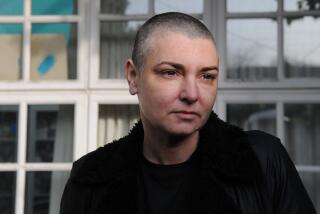Siobhan McKenna, Irish Actress, Dies
- Share via
Siobhan McKenna, whose broad brogue and booming voice made her the definitive and probably the best-known member of the Irish theater of her time, has died in a Dublin clinic.
She was either 63 or 64 and died Sunday after undergoing surgery for lung cancer.
Her classic Irish face framed by flaming red hair made her “the physical embodiment of Mother Ireland,” Irish theater critic Fintan O’Toole said during the Dublin Theater Festival earlier this year.
She probably will be longest remembered for her “Saint Joan” in George Bernard Shaw’s contemporary account of the Maid of Orleans.
“From the moment she made her entrance, barefoot, in a tattered red flannel dress, she held the audience spellbound,” said Monday’s Times of London, calling the performance “her most famous role.”
First Stage Appearance
Born on May 24 (in either 1922 or 1923) in Belfast, Miss McKenna--who said her first name was pronounced as if it were “shove-on”--grew up speaking only Gaelic. She made her first stage appearance in 1940 as a semiprofessional in a Gaelic-speaking theater in Galway.
Although most of the actors were paid 30 shillings a performance, her father--a professor at the University of Galway--insisted that his daughter work for nothing.
“He contended,” she told the Los Angeles Times in a 1957 interview, “that I should be glad of having the opportunity to speak Gaelic on the stage.”
In 1943, she was accepted into Dublin’s fabled Abbey Theater, performing in both English and Gaelic and made her London debut in 1947 as Nora in “The White Steed.”
She returned to Galway in 1951 as Joan in her own Gaelic translation of the Shavian drama, performing it in English in Ireland and London in 1953 to critical acclaim.
A Modest Success
She came to America and Broadway in 1955 as Madrigal, the mysterious governess in “The Chalk Garden,” and proved a modest success. But it was her “Saint Joan” the following year that established her with American audiences.
“A tidy young lady with a broad face, alert eyes and a voluminous voice,” wrote Brooks Atkinson for the New York Times. “Miss McKenna fairly bursts into every scene and usually at the top of her voice. . . . But the accent is Irish which makes it particularly attractive to American ears. . . . “
In 1959, she made her first trip to Hollywood for a “Playhouse 90” television production of Shaw’s “Misalliance.” It was a reluctant journey “because the great ones of the Abbey--Sara Allgood and Arthur Shields and Barry Fitzgerald--they came out here and seemed to disappear into films and dull parts,” she said at the time.
Film Roles
Miss McKenna eluded that temptation even though she did appear in a few films--”King of Kings” as the Virgin Mary; “The Playboy of the Western World” as Pegeen Mike; “Of Human Bondage” as Norah Nesbit, and “Doctor Zhivago” as Anna Gromeko.
The stage remained the focus of her career and she carved out another triumph on it in 1971 in “Here Are Ladies,” a one-woman show of Irish literary heroines.
Among the women she displayed on Broadway (and in 1972 in Los Angeles) were those by Sean O’Casey, Shaw, William Butler Yeats and James Joyce.
Her rendering of Molly Bloom’s soliloquy from Joyce’s “Ulysses” was singled out by many critics as one of the most moving moments of their careers.
One-Woman Show
In 1971, American cable television showed an adaptation of the show.
Most recently she had toured in another one-woman show, “Dubliners, Exiles, Epiphanies” and was to have appeared soon in a John Huston film based on Joyce’s “The Dead.”
Married to actor Denis O’Dea, who died in 1978, Miss McKenna is survived by their son, Donnacha O’Dea.
More to Read
The biggest entertainment stories
Get our big stories about Hollywood, film, television, music, arts, culture and more right in your inbox as soon as they publish.
You may occasionally receive promotional content from the Los Angeles Times.










